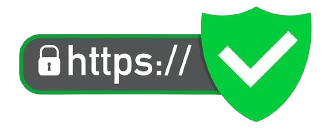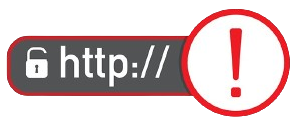What is SSL (Secure Socket Layer) ?
SSL (Secure Sockets Layer) is a security protocol that encrypts data transmitted between a user’s browser and a website server. It ensures secure communication, protects sensitive information like passwords and credit card details, and prevents hackers from intercepting data. Websites with SSL use “HTTPS” instead of “HTTP” in their URLs, indicating a secure connection.

Why Do You Need SSL ?
Data Encryption – SSL encrypts the data exchanged between a website and its users, protecting sensitive information like passwords, credit card details, and personal data from hackers.
Security & Trust – Websites with SSL display a padlock icon in the browser address bar, signaling to visitors that their connection is secure. This builds trust and credibility.
SEO Benefits – Google prioritizes HTTPS websites in search rankings, meaning SSL can help improve your website’s visibility.
Prevention of Data Tampering – SSL prevents attackers from altering data during transmission, ensuring the integrity of your website’s content.
Compliance with Regulations – Many regulations (e.g., GDPR, PCI DSS) require websites to use SSL to protect user data.
Better User Experience – Modern browsers warn users when they visit non-HTTPS websites, which can drive potential customers away. SSL eliminates these warnings and improves the user experience.
What is the Difference Between Secure and Not Secure ?

- Any information that user inputs on the page (e.g., name, address, credit card details) are not protected and can be stolen.
- Website will immediately flagged as "Not Secure"
- Weak protection for online businesses, including standards and regulations.

- Any information that user inputs on the page (e.g., name, address, credit card details) are not protected and can be stolen.
- Website will immediately flagged as "Not Secure"
- Weak protection for online businesses, including standards and regulations.
Which Type of SSL Certificate is Suitable for Your Website ?
Standard SSL
Business SSL
Organization SSL
Wildcard SSL
Compare Types of SSL Certificates
Features | Standard SSL | Organisation SSL | Business SSL | Wildcard SSL |
|---|---|---|---|---|
Best suited for | Personal Website | Company & Organization Websites | ECommerce & Business Websites | ECommerce & Business Websites |
Display Trust Indicator in Address Bar | ||||
Auto-validation, Issuance in Minutes | ||||
Registration Authority (RA) manual validation Issuance within 7 Days | ||||
Boosts Google Ranking | ||||
Strong SHA-2 & 2048-bit Encryption | ||||
Padlock in Address Bar | ||||
Security Trust Seal | ||||
Protects All Subdomains (Wildcard SSL) | ||||
Certificate Features
Encrypt Sensitive Data
Secure Online Transactions
Prove Legitimacy
Stronger & Fatest SSL
99.9% Browser Compatibility
Increase SEO Rank
Instant Issuance
Free Reissues
FAQs
What is SSL ? What does SSL stand for ?
The SSL (Secure Socket Layer) protocol is the web standard for encrypting communications between users and web sites. Data sent via an SSL connection is protected by encryption, a mechanism that prevents eavesdropping and tampering with any transmitted data. SSL provides businesses and consumers with the confidence that private data sent to a website, such as credit card numbers, is kept confidential.
When do I need an SSL Certificate ?
The SSL (Secure Socket Layer) protocol is the web standard for encrypting communications between users and web sites. Data sent via an SSL connection is protected by encryption, a mechanism that prevents eavesdropping and tampering with any transmitted data. SSL provides businesses and consumers with the confidence that private data sent to a website, such as credit card numbers, is kept confidential.
What's the requirement to purchase a SSL ?
You need to have a domain name and a dedicated IP for your website in order to setup the SSL to your website.
How soon can I get my SSL Certificate ?
For QuickSSL, you may receive the SSL within 24 hours after your domain name is validated and authenticated by GeoTrust. For a fully authenticated certificate such as Power Server ID or True BusinessID certificate and it can take 3 to 5 days to be issued.
Wildcard SSL takes about 10 days to complete.
What is the difference between HTTP and HTTPS Protocol ?
In fact, TLS is just a newer version of SSL. It fixes some security problems in the SSL protocols that came before it.
Since they are so similar, people often use the two terms interchangeably and get them mixed up. Some people still say “SSL” when they mean “TLS.” Others say “SSL/TLS encryption” because SSL is still so well-known.
Can I try an SSL Certificate before purchasing ?
No. There is no trial SSL certificate available.
Who can get an Organisation SSL Certificate
Corporations, LLCs, sole proprietorships, partnerships, governments, and schools. Basically any entity that is legally registered with your local or state government.
Can I apply for an EV Certificate as an Individual ?
No, individuals, that are not registered as a sole proprietorship, cannot apply for EV.
Trusted Our SSL Certificates are from Most Trusted Brands in Online Security



